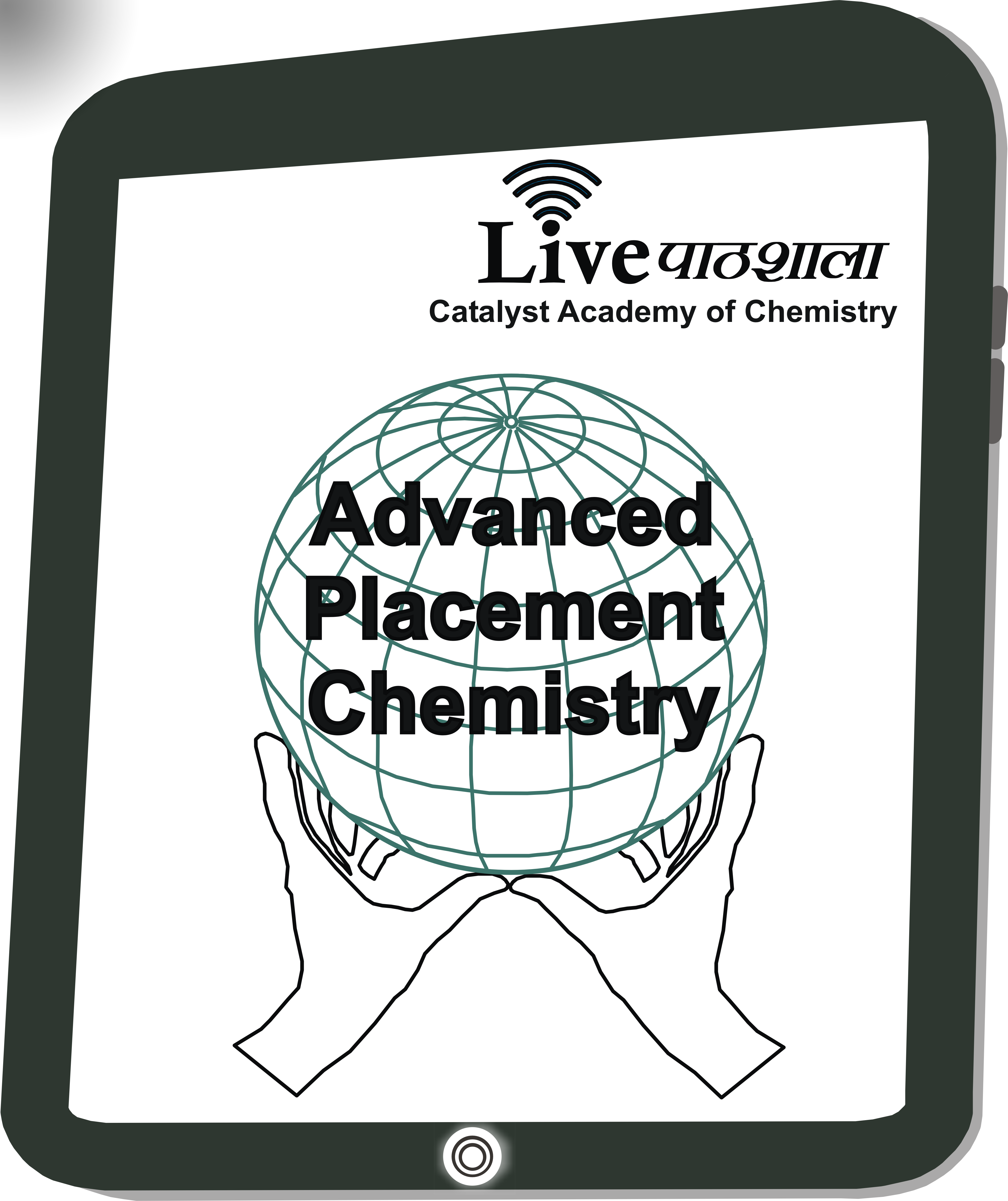About LIVE Paathshala:
LIVE Paathshala is venture of Catalyst Academy of Chemistry broadcasting Real-Time LIVE Interactive Classes (Unique blend of Conventional & Modern methods of Teaching and Learning) for students of Grade X, XI, XII and above.
The Chemistry delivered by us covers all Fundamentals of chemistry including Concepts and its Applications (such as When,Where & How), and its techniques to understand at all levels. The points covered is the integrated syllabus of all Curriculums (C.B.S.E., I.G.C.S.E. I.C.S.E. , CAMBRIDGE . . . . . .) & Universities. It also guide students about exam techniques, How to do well to achieve their Goal.
This comprehensive course includes Tips, Tricks, Techniques, Practice problems and its Applications to keep students away from Chemistry Phobia. It also guide students for selection of Carrier & also make them do well in all aspects.
COURSE OBJECTIVE :
Providing thorough grasp knowledge of Fundamentals, Concepts and its Applications, Create ability to understand applied conditions, to create ability to resolve related issues/difficulties to get proper solutions with proper results and to generate interest to know chemistry around us.
DESCRIPTION :
This program is for students of who are interested to Crack A.P. Exam by understanding Chemistry and wants to become good Scholar in Chemistry. It is intended to be a condensed review of various concepts from a typical Chemistry course. This course is a blend of video-based instruction and LIVE session interaction.
Main TOPICS:
Unit 1: Atomic Structure and Properties (Duration 10 Hrs.)
Topics may include: Moles and molar mass, Mass spectroscopy of elements, Elemental composition of pure substances, Composition of mixtures, Atomic structure and electron configuration, Photoelectron spectroscopy, Periodic trends, Valence electrons and ionic compounds (Exam Score 7% – 9%)
Unit 2: Molecular and Ionic Compound Structure and Properties (Duration 13 Hrs.)
Topics may include: Types of chemical bondsIntramolecular force and potential energy, Structure of ionic solids, Structure of metals and alloys, Lewis diagrams, Resonance and formal charge, VSEPR and bond hybridization (Exam Score 7% – 9%)
Unit 3: Intermolecular Forces and Properties (Duration 15 Hrs.)
Topics may include: Intermolecular forces, Solids, liquids, and gases, Kinetic molecular theory, Solutions and mixtures, Photoelectric effect (Exam Score 18% – 22%)
Unit 4: Chemical Reactions (Duration 15 Hrs.)
Topics may include: Introduction for reactions, Net ionic equations, Representations of reactions, Physical and chemical changes, Stoichiometry, Types of chemical reactions (Exam Score 7% – 9%)
Unit 5: Kinetics (Duration 14 Hrs.)
Topics may include: Reaction rate, Introduction to rate law, Elementary reactions, Collision model, Introduction to reaction mechanisms, Multistep reaction energy profile, Catalysis. (Exam Score 7% – 9%)
Unit 6: Thermodynamics (Duration 10 Hrs.)
Topics may include: Endothermic and exothermic processes, Heat transfer and thermal equilibrium ,Heat capacity and calorimetry, Energy of phase changes, Introduction to enthalpy of reaction, Enthalpy of formation, Hess’s law (Exam Score 7 – 9%)
Unit 7: Equilibrium (Duration 16 Hrs.)
Topics may include: Introduction to equilibrium, Calculating the equilibrium constant, Calculating equilibrium concentrations, Introduction to Le Châtelier’s principle, Introduction to solubility equilibria, pH and solubility, Free energy of dissolution. (Exam Score 7% – 9%)
Unit 8: Acids and Bases (Duration 15 Hrs.)
Topics may include: Introduction to acids and bases, pH and pOH of strong acids and bases, Acid-base reactions and buffers, Molecular structure of acids and bases, pH and pKa, Properties of buffers (Exam Score 11% – 15%)
Unit 9: Applications of Thermodynamics (Duration 13 Hrs.)
Topics may include: Introduction to entropy, Gibbs free energy and thermodynamic favorability, Thermodynamic and kinetic control, Free energy and equilibrium, Galvanic (voltaic) and electrolyte cells, Electrolysis and Faraday’s law (Exam Score 7% – 9%)
Pre Reading : Content of previous Topics.
Home Work : DPP
Language of Teaching : English (Additional Languages : Marathi, Hindi )
Duration : 90 minutes every day : (60 minutes Teaching; 30 minutes Doubt Clearing)
Total 150 Hrs.
Class Schedule : Monday to Friday : INDIA, SINGAPORE, MALAYSIA, JAPAN, USA
Sunday to Thursday : Gulf & UAE
Doubt Clearing Session : Every Day (Start & End of Class)
STATUS : ADMISSION Closed.
| COUNTRY | TIME ZONE | BATCH TIME | STARTS ON | ENDS ON |
| GULF | GMT +3.0 | 06:30 p.m. to 07:30 p.m. | ||
| U.A.E. | GMT +4.0 | 06:45 p.m. to 07:45 p.m. | ||
| SINGAPORE | GMT +8.0 | 07:45 p.m. to 8:45 p.m. | ||
| MALAYSIA | GMT +8.0 | .07:45 p.m. to 8:45 p.m. | ||
| JAPAN | GMT +9.0 | 07:30 p.m. to 8:30 p.m. | ||
| USA | UTC -5.0 | 07:30 p.m. to 8:30 p.m. |
|
- No any Video is uploaded on " YOU TUBE".
- Before Registration please attend "Free Demonstration" to firmly affirm our Teaching Methodology & Feasibility of System.
Faculty : Dilip K. Darodkar
Fees : Fees : $ 240.09/- INR 19999 /-, $ 1.60/- per Hour [ $ 1000/- 75% Off ]
Note :
- For Real-time LIVE Interactive classes no need of any App.
- Classes are easily accessed through Google Chrome.
- Web-Cam and Headphone with in-built microphone must be active for LIVE Interactive Communication.
For any query related to Topic/Course, Please feel Free to write us at Contact or call +91 770 945 6867 (Whatsapp/Signal/Botim) / +91 712 295 0302.
.
